| Listing 1 - 10 of 15 | << page >> |
Sort by
|
Book
Year: 2004 Publisher: [Washington, D.C.] : United States Dept. of Education, National Center for Education Statistics,
Abstract | Keywords | Export | Availability | Bookmark
 Loading...
Loading...Choose an application
- Reference Manager
- EndNote
- RefWorks (Direct export to RefWorks)
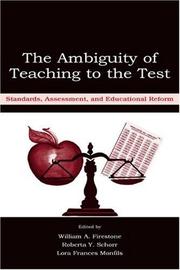
ISBN: 1135624216 1282320920 9786612320927 1410609944 9781410609946 9780805845686 0805845682 9780805845693 0805845690 0805845682 0805845690 9781135624163 9781135624200 9781135624217 Year: 2004 Publisher: Mahwah, NJ L. Erlbaum Associates Publishers
Abstract | Keywords | Export | Availability | Bookmark
 Loading...
Loading...Choose an application
- Reference Manager
- EndNote
- RefWorks (Direct export to RefWorks)
Testing is one of the most controversial of all state and federal educational policies. The effects of testing are quite ambiguous. The same test may lead to different consequences in different circumstances, and teachers may use very different strategies to prepare students for tests. Although most experts agree that mandatory testing leads to teaching to the test, they disagree about whether it leads to meaningless drill, wasted time, de-professionalizing teachers, and demotivating students, or to more challenging and thoughtful curricula, more engaging teaching, increased student mot
Educational tests and measurements --- Education --- Mathematics --- Science --- Standards
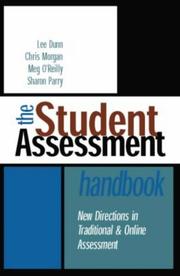
ISBN: 1134310145 128005705X 0203416511 9780203416518 9780415335300 0415335302 9780749438838 0749438835 0415335302 0749438835 9786610057054 6610057052 9781134310098 9781134310135 9781134310142 9781138147355 1134310137 Year: 2004 Publisher: London New York RoutledgeFalmer
Abstract | Keywords | Export | Availability | Bookmark
 Loading...
Loading...Choose an application
- Reference Manager
- EndNote
- RefWorks (Direct export to RefWorks)
A guide to current practice in assessment, particularly for those professionals coming to terms with new pressures on their traditional teaching practices. Increased use of IT, flexible assessment methods and quality assurance all affect assessment, and the need to diversify and adapt traditional assessment practices to suit new modes of learning is clearer than ever.The Student Assessment Handbook looks at the effectiveness of traditional methods in the present day and provides guidelines on how these methods may be developed to suit today's teaching environments. It is a practic
College students --- Educational tests and measurements --- College life --- Universities and colleges --- University students --- Students --- Rating of --- Education
Book
Year: 2004 Publisher: [Washington, DC] : U.S. Dept. of Education, Institute of Education Sciences,
Abstract | Keywords | Export | Availability | Bookmark
 Loading...
Loading...Choose an application
- Reference Manager
- EndNote
- RefWorks (Direct export to RefWorks)
Mathematics --- Mathematical ability --- Urban schools --- Educational tests and measurements --- Study and teaching (Elementary) --- Evaluation. --- Testing --- NAEP Trial Urban District Assessment.
Book
ISBN: 2804146782 9782804146788 Year: 2004 Volume: *46 Publisher: Bruxelles: De Boeck,
Abstract | Keywords | Export | Availability | Bookmark
 Loading...
Loading...Choose an application
- Reference Manager
- EndNote
- RefWorks (Direct export to RefWorks)
Evaluatie in het onderwijs --- Evaluation dans l'enseignement --- Students --- Educational tests and measurements --- Elèves --- Tests et mesures en éducation --- Rating of --- Evaluation --- Elèves --- Tests et mesures en éducation
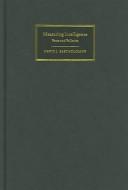
ISBN: 9780511490019 9780521836197 9780521544788 9780511210778 0511210779 0521836190 0521544785 0511207174 9780511207174 0511212542 9780511212543 0511214359 9780511214356 0511490011 0511216149 9780511216145 1280540192 9781280540196 9786610540198 6610540195 0511210779 0521836190 0521544785 1107149991 051131504X Year: 2004 Publisher: Cambridge, UK ; New York : Cambridge University Press,
Abstract | Keywords | Export | Availability | Bookmark
 Loading...
Loading...Choose an application
- Reference Manager
- EndNote
- RefWorks (Direct export to RefWorks)
The testing of intelligence has a long and controversial history. Claims that it is a pseudo-science or a weapon of ideological warfare have been commonplace and there is not even a consensus as to whether intelligence exists and, if it does, whether it can be measured. As a result the debate about it has centred on the nurture versus nature controversy and especially on alleged racial differences and the heritability of intelligence - all of which have major policy implications. This book aims to penetrate the mists of controversy, ideology and prejudice by providing a clear non-mathematical framework for the definition and measurement of intelligence derived from modern factor analysis. Building on this framework and drawing on everyday ideas the author address key controversies in a clear and accessible style and explores some of the claims made by well known writers in the field such as Stephen Jay Gould and Michael Howe.
Intelligence tests. --- Psychological tests. --- Mental tests --- Psychological assessment --- Tests, Psychological --- Psychology --- Testing --- Clinical psychology --- Educational tests and measurements --- Intelligence levels --- Intelligence testing --- IQ tests --- Psychological tests --- Methodology --- Health Sciences --- Psychiatry & Psychology
Book
ISBN: 0821358499 9786610084197 1280084197 1417544643 Year: 2004 Publisher: Washington, D.C. : World Bank,
Abstract | Keywords | Export | Availability | Bookmark
 Loading...
Loading...Choose an application
- Reference Manager
- EndNote
- RefWorks (Direct export to RefWorks)
School management --- Sub-Saharan Africa --- Educational evaluation --- Educational tests and measurements --- Educational assessment --- Educational measurements --- Mental tests --- Tests and measurements in education --- Psychological tests for children --- Psychometrics --- Students --- Examinations --- Psychological tests --- Educational program evaluation --- Evaluation research in education --- Instructional systems analysis --- Program evaluation in education --- Self-evaluation in education --- Evaluation --- Rating of
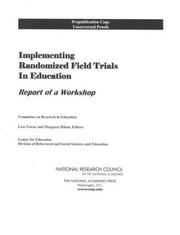
ISBN: 1280176199 9786610176199 0309531551 9780309531559 6610176191 0309091926 9780309091923 9781280176197 0309166330 9780309166331 Year: 2004 Publisher: Washington, D.C. National Academies Press
Abstract | Keywords | Export | Availability | Bookmark
 Loading...
Loading...Choose an application
- Reference Manager
- EndNote
- RefWorks (Direct export to RefWorks)
Education --- Educational tests and measurements. --- Educational assessment --- Educational measurements --- Mental tests --- Tests and measurements in education --- Psychological tests for children --- Psychometrics --- Students --- Examinations --- Psychological tests --- Children --- Education, Primitive --- Education of children --- Human resource development --- Instruction --- Pedagogy --- Schooling --- Youth --- Civilization --- Learning and scholarship --- Mental discipline --- Schools --- Teaching --- Training --- Research --- Methodology. --- Rating of --- #PBIB:2005.1 --- Research&delete& --- Methodology
Book
ISBN: 2760511030 9782760511033 9781435686823 1435686829 2760516660 Year: 2004 Publisher: Sainte-Foy : Presses de l'Université du Québec,
Abstract | Keywords | Export | Availability | Bookmark
 Loading...
Loading...Choose an application
- Reference Manager
- EndNote
- RefWorks (Direct export to RefWorks)
Théorie des réponses aux items. --- Sciences sociales --- Tests et mesures en éducation. --- Psychométrie. --- Item response theory. --- Social sciences --- Educational tests and measurements. --- Psychometrics. --- Modèles mathématiques. --- Méthodes statistiques. --- Mathematical models. --- Statistical methods. --- Modèles Modellen --- Mesure Maat --- Evaluation Evaluatie --- Apprentissage Leerproces --- Educational tests and measurements --- Item response theory --- Psychometrics --- Measurement, Mental --- Measurement, Psychological --- Psychological measurement --- Psychological scaling --- Psychological statistics --- Psychology --- Psychometry (Psychophysics) --- Scaling, Psychological --- Psychological tests --- Scaling (Social sciences) --- Educational assessment --- Educational measurements --- Mental tests --- Tests and measurements in education --- Psychological tests for children --- Students --- Examinations --- Mathematical models --- Statistical methods --- Measurement --- Scaling --- Methodology --- Rating of --- Théorie des réponses aux items. --- Tests et mesures en éducation. --- Psychométrie. --- Modèles mathématiques. --- Méthodes statistiques.
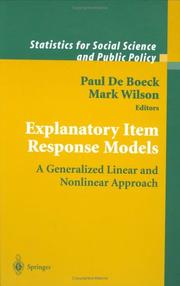
ISBN: 0387402756 1441923233 1475739907 Year: 2004 Publisher: New York, N.Y. Springer
Abstract | Keywords | Export | Availability | Bookmark
 Loading...
Loading...Choose an application
- Reference Manager
- EndNote
- RefWorks (Direct export to RefWorks)
This edited volume gives a new and integrated introduction to item response models (predominantly used in measurement applications in psychology, education, and other social science areas) from the viewpoint of the statistical theory of generalized linear and nonlinear mixed models. The new framework allows the domain of item response models to be co-ordinated and broadened to emphasize their explanatory uses beyond their standard descriptive uses. The basic explanatory principle is that item responses can be modeled as a function of predictors of various kinds. The predictors can be (a) characteristics of items, of persons, and of combinations of persons and items; (b) observed or latent (of either items or persons); and they can be (c) latent continuous or latent categorical. In this way a broad range of models is generated, including a wide range of extant item response models as well as some new ones. Within this range, models with explanatory predictors are given special attention in this book, but we also discuss descriptive models. Note that the term "item responses" does not just refer to the traditional "test data," but are broadly conceived as categorical data from a repeated observations design. Hence, data from studies with repeated observations experimental designs, or with longitudinal designs, may also be modelled. The book starts with a four-chapter section containing an introduction to the framework. The remaining chapters describe models for ordered-category data, multilevel models, models for differential item functioning, multidimensional models, models for local item dependency, and mixture models. It also includes a chapter on the statistical background and one on useful software. In order to make the task easier for the reader, a unified approach to notation and model description is followed throughout the chapters, and a single data set is used in most examples to make it easier to see how the many models are related. For all major examples, computer commands from the SAS package are provided that can be used to estimate the results for each model. In addition, sample commands are provided for other major computer packages. Paul De Boeck is Professor of Psychology at K.U. Leuven (Belgium), and Mark Wilson is Professor of Education at UC Berkeley (USA). They are also co-editors (along with Pamela Moss) of a new journal entitled Measurement: Interdisciplinary Research and Perspectives. The chapter authors are members of a collaborative group of psychometricians and statisticians centered on K.U. Leuven and UC Berkeley.
Quantitative methods in social research --- Mathematical statistics --- #PBIB:2005.1 --- Academic collection --- 303.7 --- Analysetechnieken. Statistische analyse --(sociaal onderzoek) --- 303.7 Analysetechnieken. Statistische analyse --(sociaal onderzoek) --- Item response theory --- Psychometrics --- Social sciences --- Behavioral sciences --- Human sciences --- Sciences, Social --- Social science --- Social studies --- Civilization --- Measurement, Mental --- Measurement, Psychological --- Psychological measurement --- Psychological scaling --- Psychological statistics --- Psychology --- Psychometry (Psychophysics) --- Scaling, Psychological --- Psychological tests --- Scaling (Social sciences) --- Educational tests and measurements --- Statistics&delete& --- Databases --- Measurement --- Scaling --- Methodology --- Statistics . --- Assessment. --- Psychometrics. --- Statistics for Social Sciences, Humanities, Law. --- Assessment, Testing and Evaluation. --- Statistical analysis --- Statistical data --- Statistical methods --- Statistical science --- Mathematics --- Econometrics --- Statistics
| Listing 1 - 10 of 15 | << page >> |
Sort by
|

 Search
Search Feedback
Feedback About UniCat
About UniCat  Help
Help News
News